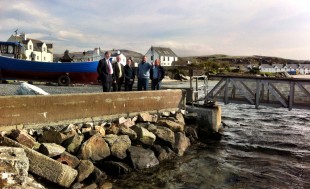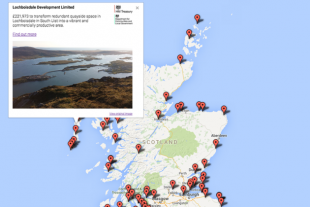
Any islander will tell you that there’s something special about living beside the sea. It’s a part of life and, for many of us, a way of life.
I believe our island communities know how to make the most of the opportunities the environment presents to them.
I may be biased - after all I grew up on an Islay farm, have made my home in Orkney and have been MP for Orkney and Shetland since 2001. However, I see on a regular basis how some of the best ideas for improving lives, creating jobs and boosting the economy in coastal communities come from the people who live there.
Helping communities to turn these ideas into reality is part of what it means to be a liberal and is an important part of the UK Government’s long term economic plan. This was highlighted again this week as my colleague Danny Alexander announced over £9.5m of funding for projects on Scotland’s shoreline as part of the Coastal Communities Fund (CCF).
The fund is financed from revenues from the Crown Estate’s marine activities and, since its creation in 2012, has provided over £17m of funding.
The range of successful projects reflects the ambition, creation and innovation which exists within Scotland's island and coastal communities. These have ranged from a new pontoon for visiting sailing and other leisure craft at Eyemouth Harbour to a new wool centre on Unst on Shetland.

There can be no doubt our coastal communities face challenges but, as the CCF shows, the coastline create opportunities.Hundreds of miles separate Eyemouth from the UK’s most northerly island but they share the same ambition, creation and innovation which exists within so many of Scotland’s coastal communities.
As Scottish Secretary I’ve seen some great examples on the road. Just a few miles from my parent’s farm is the waterfront and harbour at Port Ellen on Islay – and last year I heard how £330,000 of CCF funding will help increase its capacity so more tourists can arrive to enjoy the wildlife and scenery, as well as the world-famous single malt whiskies.
Speaking to those involved it’s clear the fund is not just about providing money; it’s seen as the platform for bigger and better ideas and this is what the CCF is all about.
Bringing management of the seabed from the centre back to Scotland’s coastal communities was part of my maiden speech in Parliament in 2001 and is something I’ve focused on ever since. The creation of the Coastal Communities Fund was the first meaningful reform of the Crown Estate since the Crown Estate Act of 1962. Having a means of feeding the money earned by the Estate back into the coastal and island communities from which it came was enormously significant and money from the Fund has done a tremendous amount of good in a remarkably short period of time.
For me, however, the establishment of the Coastal Communities Fund was never going to be the end of the story. I have continued to see reform of the Crown Estate as a piece of unfinished business.
This is why I was delighted that - as part of the Smith Agreement - responsibility of the management of Crown Estate economic assets – including the seabed – will be devolved to the Scottish Parliament and onwards to our island communities to, the north and west of Scotland.
Devolution doesn’t just mean the flow of powers from one Parliament to another, it’s about empowering our regions and our communities across Scotland and the UK. That is why the "double devolution" of the Crown Estate matters so much.
For those of us living and working in Scotland's island communities government in Edinburgh can often seem as remote and indifferent as government from Whitehall ever did. There is certainly no denying that recent years have seen a steady flow of power and control being taken away from the isles and held in Edinburgh. A reformed Crown Estate must not follow the same route.
Last week we committed this historic cross party agreement to draft legislation, bringing more powers to Scotland whilst ensuring we continue to benefit from the UK’s economic strength. This agreement is built to last and strikes the right balance of powers for Scotland as part of the UK not least for our island communities.
Follow the Scotland Office on Twitter, and don’t forget to sign up for our newsletter.
